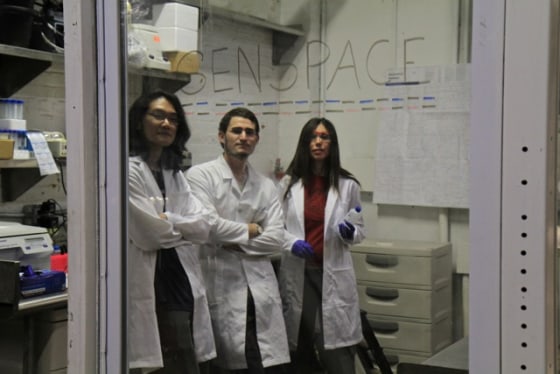Artists, would-be scientists, and lab researchers with interests outside the bounds of their institution funding have a space to gather in New York City to pursue whatever biotech experiments they can dream up.
The lab, called Genspace, is billed as a nursery for biotech entrepreneurs. It's compliant with the Center for Disease Control's biosafety level 1 regulations, meaning its a safe place to conduct professional-level science.
The FBI was at first concerned a public biotech lab in the city could be breeding grounds for bioterrorism and drug manufacturing, but the founders hashed out the worries with the agencies and received approval, according to a profile of the lab in Wired.com.
"The FBI now uses pictures of our space to show people what a [methamphetamine] drug lab doesn't look like," Genspace president and co-founder Ellen Jorgensen, who's also a biomedical researcher at New York Medical College, told Wired.
Much of the gear in the cobbled-together lab, two years in the making, was donated. But that's not stopping bona fide research. Jorgensen is working on a compact, cost-effective lab-in-a-box based on collapsible furniture that can be built by students and used in schools.
"The project complements the trend towards simplification and miniaturization of key lab components such as PCR machines and gel electrophoresis," notes the lab's website.
Another member, co-founder and freelance journalist Daniel Gushkin, is working on an experiment to get bacteria to play a game of tag with each other.
"He hopes that through time-lapse video he will be able to see bacterial clones chase one another in a petri dish as an artistic exercise in the power of genetic engineering," the lab explains.
Membership in the community is $100 a month and members can use the space for whatever experiments they choose. What would you work on? Feel free to weigh in with a comment below.
More on do-it-yourself science
- Make your own geeky gift goodness
- Do-it-yourself DNA testing: Helpful or harmful?
- Solar power coming to a store near you
- Hobbyist try genetic engineering at home
To learn more about Genspace, read David Mosher's profile on Wired.com
John Roach is a contributing writer for msnbc.com. Connect with the Cosmic Log community by hitting the "like" button on the Cosmic Log Facebook page or following msnbc.com's science editor, Alan Boyle, on Twitter (@b0yle).
